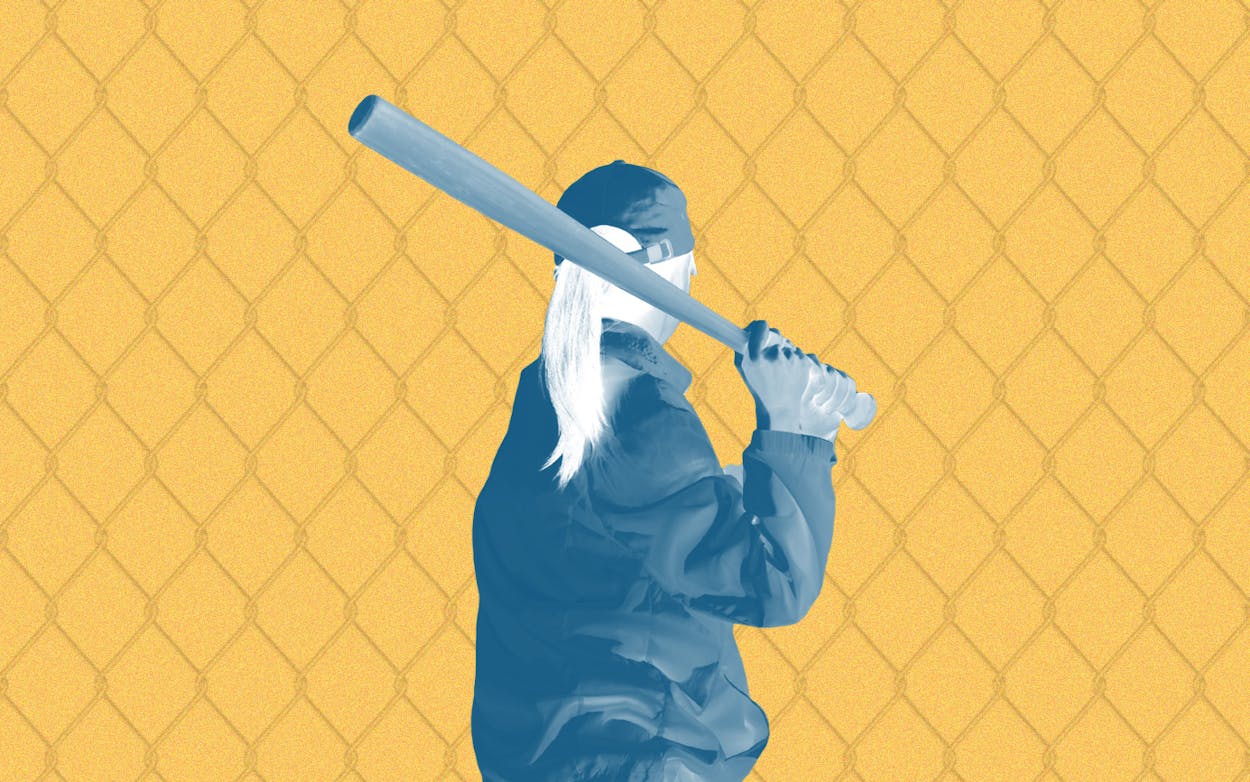The Round Rock Express opened their season at Dell Diamond on Tuesday night, losing 3-1 in a game that turned on a couple of blown calls by the ump. Despite the boos from the crowd, though, the AAA affiliate for the Houston Astros know that the final score isn’t what many in the ballpark are most interested in. These are the minor leagues, and the experience of a great live game is much of the draw.
That’s part of what made Dell Diamond the ideal location for the first Home Run Dugout, a sports entertainment business founded by Texas natives Nick Hermandorfer and Tyler Bambrick, in partnership with Nolan Ryan’s Ryan-Sanders Baseball. The company aims to be the baseball equivalent of Top Golf, offering an indoor, augmented reality experience that serves as the grown-up answer to the old batting cages—fans can rent out batting bays both during game days and when the Express are out of town. “One thing that really attracted us to Dell Diamond was their staff’s mentality about the games,” Hermandorfer says. “They know that people are coming here for entertainment. They’re like, ‘If people leave here and they don’t know the score of the game, we’ve done our job.'”
Home Run Dugout currently takes up a small space behind Dell Diamond’s outfield, with windows providing a view of the game on game days. There are two batting bays, which are rented in two-hour blocks. On game days, those blocks cost $60 per person, with a twelve-person minimum, and each admission fee includes a game ticket, a parking pass, and a $20 credit for food and drink at the accompanying restaurant; on days when the Express aren’t playing, the price drops to $45, the food credit to $15, and the minimum number of players to six. Reservations are made in advance.
The experience of playing at Home Run Dugout is unique. It’s not really reminiscent of a batting cage, outside of the fact that you’re holding a bat—you’re indoors, you don’t wear a helmet, and the ball pops up from the ground near home plate, rather than being sent toward you at 70 mph. The augmented-reality side of it comes in when you connect with the ball—the venue tracks the exit velocity and launch angle, telling you exactly where your ball would land in any major league stadium (a stat that can be humbling). “When your dad’s first teaching you to swing as a little kid, he takes a knee and does the soft toss,” Hermandorfer says. “For me and my brothers, he’d toss sunflower seeds, to teach us about eye contact and keeping your eye on the target. We want to get people comfortable—there are a lot of people who, when they first step into that bay, their reaction is, ‘Wow, I haven’t touched a bat in years. That feels good.'”
Hermandorfer and Bambrick came up with the concept after the pair—who were childhood fishing buddies—reconnected at the University of Texas’s McCombs Business School. They played softball, but when games would get rained out or they’d find themselves unable to field a full team, they’d try to talk their opponents into doing a home run derby. “But no one wanted to pitch and no one wanted to shag balls,” Hermandorfer says. “Everyone just wanted their turn at bat and to drink beer. I thought, ‘Wouldn’t it be awesome to create a solution to this?'”
The two decided to take the idea seriously. In 2016, Bambrick was interviewing for a job, and opted not to keep pursuing it—instead, he offered Hermandorfer space in his grandmother’s garage in San Marcos, funding the project themselves for the first two years. “I was like, ‘Screw it, let’s do this,'” Bambrick says. Ryan-Sanders came on board as what Bambrick calls a “sponsoring investor”—offering not just money, but also guidance in the sports industry, the opportunity to break ground with the first location at Dell Diamond, and a connection to Glynn Bloomquist, who quickly became an investor and now serves as the company’s executive chairman. But the company’s ambitions go well beyond a single, two-bay location at Dell Diamond. “If we’re successful, we have several avenues for expansion,” Bloomquist says. “Major and minor league ballparks are an easy one, but [so are] existing entertainment venues, or a standalone facility, with 12-15 bays.” They can imagine a day when ballparks across Texas, and then America, have Home Run Dugout locations, or when the bays appear at adult-oriented entertainment venues—Bloomquist name-drops Punch Bowl Social, the Denver-based chain that currently operates a location in Austin’s Domain and has two locations in Dallas-Fort Worth expected by the end of 2019, as the sort of partner they’d like to work with. (“It’s more adult,” Bambrick says. “A place like Dave and Buster’s would be our third choice.”) They could see putting Home Run Dugout locations in strip malls as destinations unto themselves. Top Golf takes up a lot of space, but with this concept, there’s a lot of flexibility. Bambrick compares it to ax-throwing or bowling, and the founders see it as a chance for groups to compete among themselves with some quantifiable metrics in a sport that it normally takes a lot of planning, running, and organizing to play as an adult.
“It’s about making the batting cage more social,” Hermandorfer says. “You can get a group in there, there’s always something going on, and you can really feel what things like exit velocity and launch angle mean.”
- More About:
- Sports
- Nolan Ryan
- Round Rock








